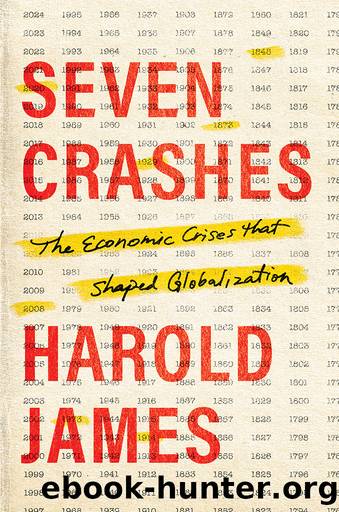Seven Crashes by Harold James;

Author:Harold James;
Language: eng
Format: epub
Publisher: Yale University Press
Published: 2022-06-15T00:00:00+00:00
6
The Great Recession: 2008
Robert Lucasâs 2003 Presidential Address at the American Economic Association started with the proposition that modern macroeconomics, born out of the angst of the Great Depression, had âin this original sense . . . succeeded: Its central problem of depression prevention has been solved, for all practical purposes, and has in fact been solved for many decades.â At the time, this seemed a statement of a broad theoretical consensus that the era of major downturns had ended for good; after 2008 it was widely ridiculed; but by 2021 it was again frequently cited with approbation.1 The Great Depression had been a crisis of globalizationâand the sense of deep and perhaps unsolvable crisis in 2008 inevitably brought the historical analogy. But in the Great Recession that followed the Global Financial Crisis of 2007â2008, globalization was contested, not overthrown. To the extent that it was rescued or revived, the immediate impulse came from central banks. These institutions now constituted the heart of policy-making.
A financial shock with clear origins in the United States in 2008 generated a dramatic collapse in global demand and in international trade. It challenged U.S. leadership in the global economy: the real underpinning not only of the Bretton Woods concept, but also of the ânonsystemâ (a term coined by the economist John Williamson) that had prevailed in monetary matters since the 1970s. Learning lessons from an apparently similar collapse in demand, the Great Depression, involved an unprecedented degree of action and coordination in bank rescues, the use of monetary policy to supply liquidity, fiscal stimulus, and agreement generally to keep open markets. But the political-economy implications of this apparently initially astonishingly successful intervention hit back: if fiscal effort was mostly in practice about rescuing banks, wasnât that a taxpayer-financed reward of the culprits and villains?
What became conventionally known as the Global Financial Crisis or the Great Recession (to distinguish it from, but also draw an analogy with, the interwar Great Depression) was blamed by many policy-makers on globalization. Thus, for instance, Mervyn King, governor of the Bank of England: âThe origins of the crisis lay in our inability to cope with the consequences of the entry into the world trading system of countries such as China, India, and the former Soviet empireâin a word, globalisation.â2 Globalization was running too hot. In the 1920s, the same phenomenon ended with a collapse of credit structures and a radical contraction of demand. In the 1970s, economic overheating generated an inflationary build-up of credit and a great deal of uncertainty and doubt about political institutions, but no collapse. Ãscar Jordà , Moritz Schularick, and Alan M. Taylor suggest loose monetary conditions, the product of globalized finance, were a key trigger of bubbles and financial stress, with structural changes in finance magnifying that effect.3 In the new millennium, the old systems were misfiring, breaking down. Was the new crisis the end of globalization, or the end of capitalism? The parallels to the 1920s collapse appeared inescapable. In the Great Depression, monetary authorities
Download
This site does not store any files on its server. We only index and link to content provided by other sites. Please contact the content providers to delete copyright contents if any and email us, we'll remove relevant links or contents immediately.
International Integration of the Brazilian Economy by Elias C. Grivoyannis(74650)
The Radium Girls by Kate Moore(11619)
Turbulence by E. J. Noyes(7700)
Nudge - Improving Decisions about Health, Wealth, and Happiness by Thaler Sunstein(7242)
The Black Swan by Nassim Nicholas Taleb(6762)
Rich Dad Poor Dad by Robert T. Kiyosaki(6174)
Pioneering Portfolio Management by David F. Swensen(6078)
Man-made Catastrophes and Risk Information Concealment by Dmitry Chernov & Didier Sornette(5646)
Zero to One by Peter Thiel(5488)
Secrecy World by Jake Bernstein(4388)
Millionaire: The Philanderer, Gambler, and Duelist Who Invented Modern Finance by Janet Gleeson(4093)
The Age of Surveillance Capitalism by Shoshana Zuboff(3983)
Skin in the Game by Nassim Nicholas Taleb(3965)
The Money Culture by Michael Lewis(3846)
Bullshit Jobs by David Graeber(3827)
Skin in the Game: Hidden Asymmetries in Daily Life by Nassim Nicholas Taleb(3720)
The Dhandho Investor by Mohnish Pabrai(3560)
The Wisdom of Finance by Mihir Desai(3523)
Blockchain Basics by Daniel Drescher(3329)
